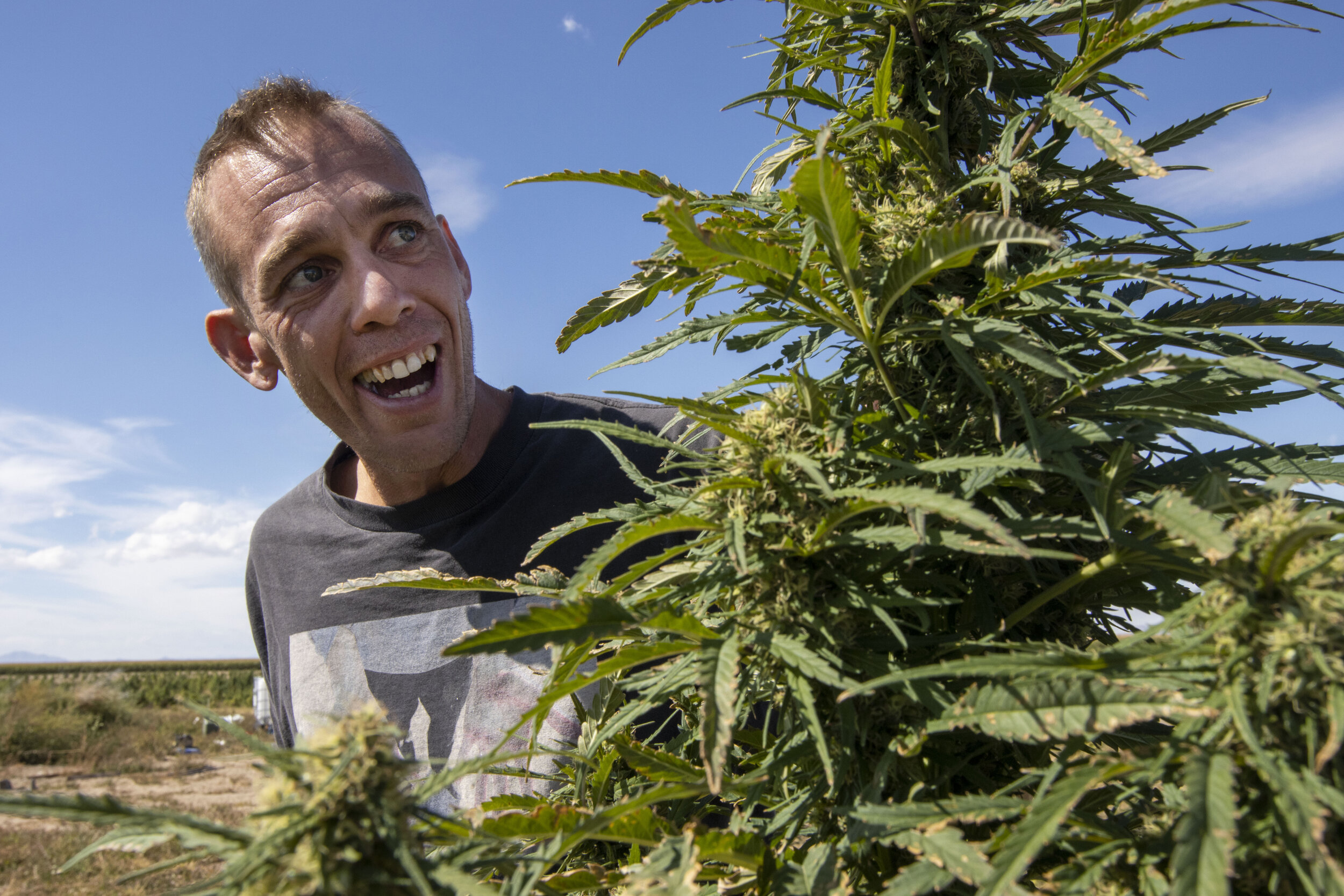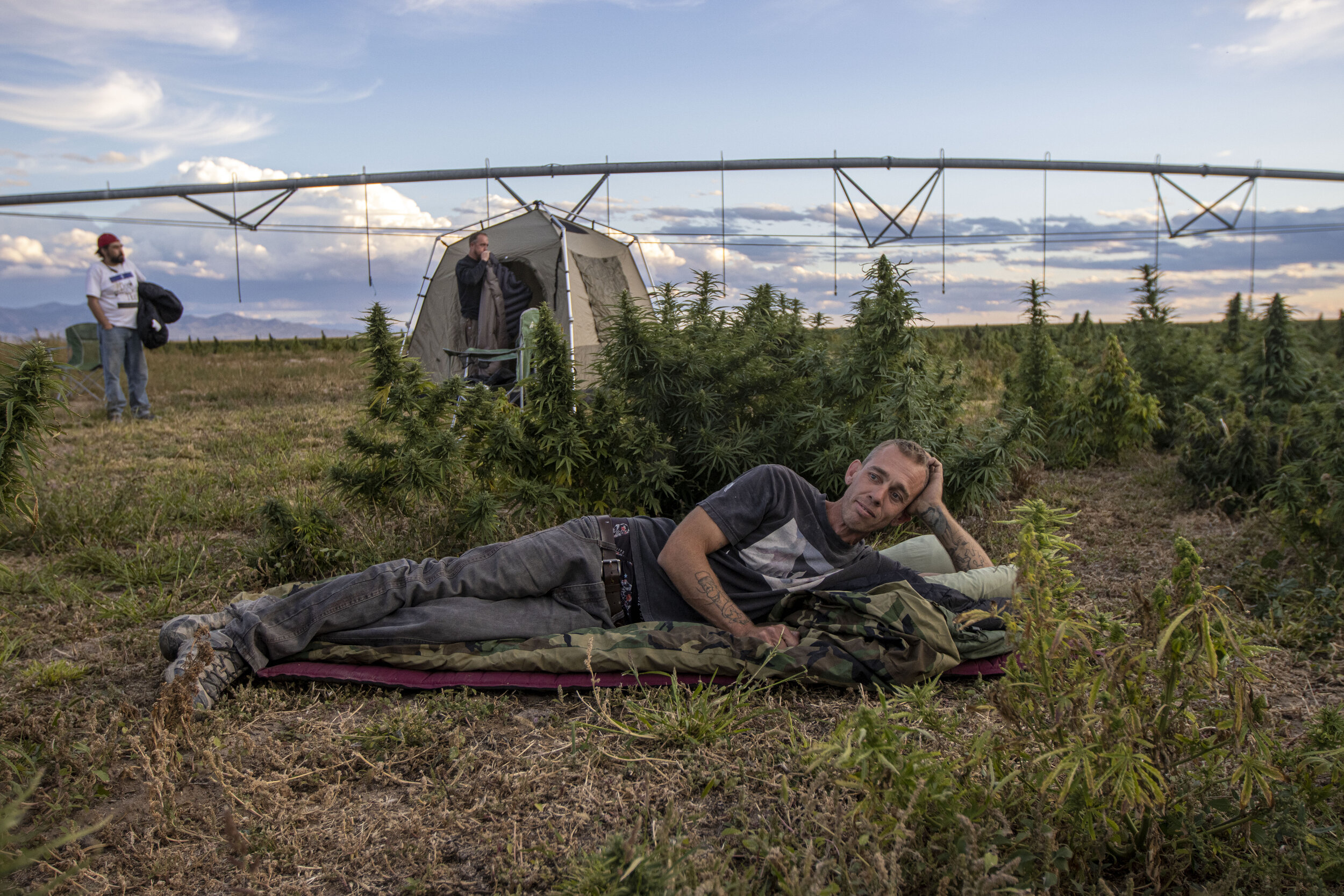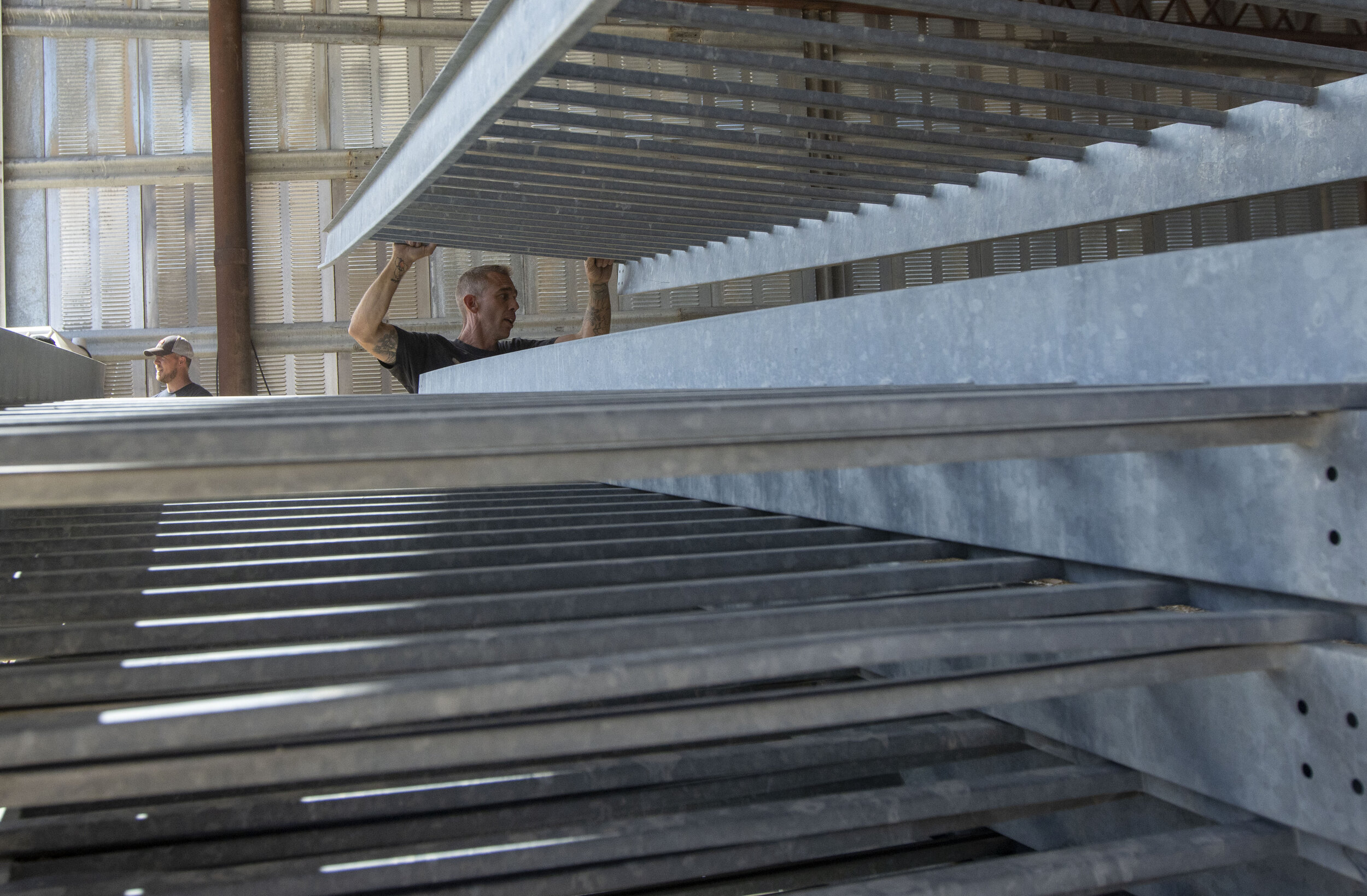A black SUV carrying a car full of middle aged opioid addicts pulled into a 40 acre, wind swept hemp farm in Delta, Utah. Four men tumbled out of the car like puppies at the dog park. With unbridled joy they proceeded to prance from plant to plant gently cradling the buds in their hands to sniff, taking selfies, giggling without a care in the world. The Japanese have a word, “Shinrin-yoku”, which has been translated popularly as “forest bathing, ” or spending time in the forest in a mindful way as a benefit to one’s body and mind. The spectacle of these grown men skipping amongst rows of ripe hemp could easily be called ”hemp-bathing”.
Shane Ericksen and men who use CBD to manage drug addictions take photos with hemp plants.
The men came to the farm to help with the harvest. 2019 is the first year hemp has been legal to farm here, this was the first crop ever. The farmer was in need of workers. Shane Ericksen, the founder of the Men’s Tribal House, a home in Salt Lake City for men in recovery where CBD and medical marijuana are used to combat drug addictions saw an opportunity. The CBD slated to be extracted from the hemp was contracted to be used in a medicinal lotion he produces. So, he organized some of the men in the house to assist with the harvest.
Utah is the number one state for Opioid deaths, an estimated six people perish from prescription overdoses every week. In a response to this as well as his own experiences, Ericksen founded a recovery home and recently acquired a house that used to belong to a massive polygamist family. The many bedrooms, bathrooms, 4 kitchens, multiple dining rooms make it ideal to house a large number of people.
Ryan Severe, who uses CBD to fight his opioid addiction reacts as he strolls though rows of plant on a hemp farm.
Some of the men living in the home take CBD as well a medical THC to get their lives back on track. In Utah, that means getting a letter from a medical professional. Dr Angela Loving, who works with addicts recommends THC when patients are hesitant to use suboxone or sublocade, which are also technically addictive. Loving attributes the success of THC “Its the head-change that they are looking for, the high without being on the hard stuff,” adding “It seems to me that most substance abuse clients often are trying to self medicate for something: pain, anxiety, depression, bipolar, whatever it may be. The great thing about THC is that is helps with those diagnoses but also provides them with a reason not to use other substances.”
Charlie Wall, hemp-bathing
Ericksen started using cannabis to combat an opioid addiction five years ago. He says he immediately noticed a difference with other methods. “It helped me get over the withdrawal symptoms much quicker than any other time I had quit opiates before. Then I started to notice that with daily cannabis use I didn’t have the cravings. I got off pain pills all together and it was such a great part of my routine. But for years I thought I was just crazy, I was doing it in secret, I was a little bit ashamed of it.” In November. 2018, The Utah Medical Cannabis Act was passed, making medical use less shameful as well as legal.
Men from the Tribal Men’s House set up camp in the hemp field. Charlie Wall, opted to sleep outside under the boughs of the plants.
A hemp plant cola in the sunset, ready to be harvested.
Additionally, the Church of Jesus Christ of Latter Day Saints, which boasts many members in Utah has come out supporting the medical use of cannabis. In an official statement the church revealed, “We respect the wise counsel of the medical doctors of Utah. The public interest is best served when all new drugs designed to relieve suffering and illness and the procedures by which they are made available to the public undergo the scrutiny of medical scientists and official approval bodies.”
At group meetings in the house, Ericksen says the men discuss the virtues of cannabis use in meetings and agree that it has a remarkable power. He says, “On those days when life if just too fricken’ much, you’re going to relapse, you reach for the cannabis, and that moment, the moment you use the medical marijuana, the last thing you want to do is go get high. You don’t want to go find meth or crack. You don’t want to go drink. You don’t want to isolate. You want to become part of the group. You want you assimilate. You want to come home. You want to sleep in your own bed.”
Charlie Wall and others from the Tribal Men’s House move drying racks to prepare for the incoming biomass.
Shane Ericksen (C) places hemp on a drying rack.
Farmer Lacee McPherson (C) and men from the Tribal men’s house shuck freshly harvest cannabis.
Recovering opioid addict, David Turpin, 61 helps with the hemp harvest.
Perched in a rickety old folding chair, David Turpin, 61, sat methodically turning and trimming freshly harvested buds with a pair of gummed up garden shears. A chorus of snips punctuated the the dusty barn air while a thin version of Spirit in the Sky played from a tinny bluetooth speaker.
Turpin has been at the house for for three months and says he has successfully been using cannabis to suppress addictions to other drugs. When he was 37, he underwent a quadruple bypass and subsequently became addicted to pain pills. His doctor prescribed Lortab 10 which contains the opiate hydrocodone, of which he took 8 tablets a day, for 20 years. At 57 another doctor slashed his prescription to 60 pills a month. He says he had the choice of turning to heroin or meth to navigate the pain. He picked meth.
Today, he’s on a daily regimen of 500mg full spectrum CBD as well as the lotion made by Erickson. Back pain has been a chronic problem for Turpin, acquired from a long career in construction, lifting heavy loads, that began when he was just 15. “I swear to it, hell yeah, anybody that’s older and has doctors like I used to have, putting me on different pills all the time, so many...” his voice trailed off as he grabbed a heavy branch from little green pile of weed.
A chubby coyote is seen in a hemp field.
Ericksen says the harvest was therapeutic for the Tribal House men, “They all felt like they were giving back, helping to spread good medicine, to help other people in recovery. They had good associations and felt like their work was important and valuable.” Some of men set up a tent amongst the rows of hemp and Charlie Wall, set a sleeping bag down in between two bushy ripe plants, their boughs heavy with juicy colas where he slept under the stars.










